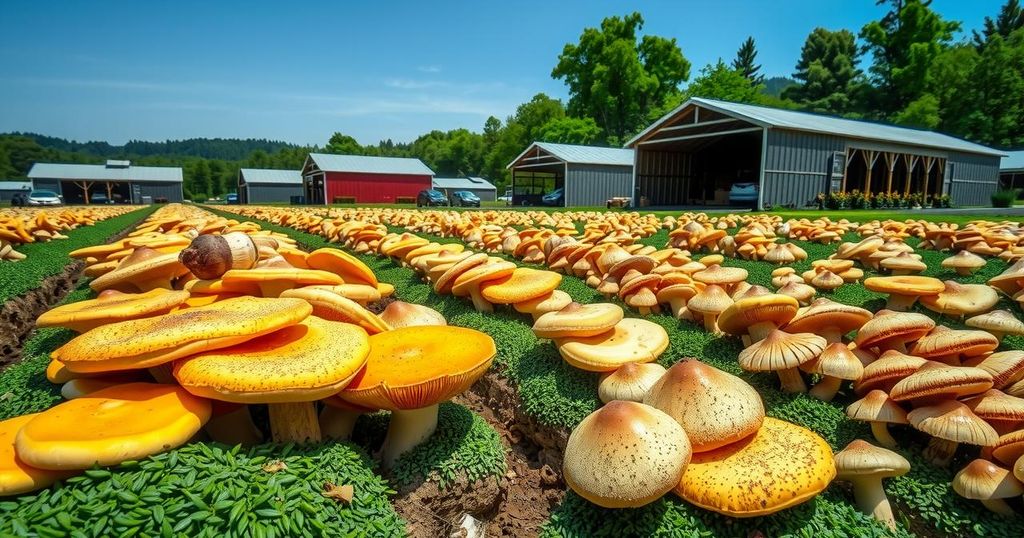Ethiopian Entrepreneur Turns Fascination With Mushrooms Into Opportunity
Mikias Tadesse’s transformation from truck driver to mushroom farmer in Ethiopia showcases how curiosity and support can drive culinary innovation. Despite initial resistance from consumers, he now cultivates various mushrooms, responding to increasing demand and aiming to deepen knowledge and promote exports. His success is a compelling example of how local entrepreneurs can reshape dietary landscapes and create economic opportunities.
In the highlands of Ethiopia, a unique culinary movement is unfolding, all thanks to a young entrepreneur named Mikias Tadesse. This 29-year-old, who has transitioned from being a truck driver to a flourishing mushroom farmer, is reshaping dietary habits while creating economic opportunities for many. Intrigued by mushrooms during a chance encounter on a construction site, Tadesse’s journey illustrates the intersection of tradition and innovation in Ethiopian cuisine.
Tadesse’s fascination with mushrooms began about three years ago when he stumbled upon some sporadic clusters at a Chinese road construction camp. Curiosity piqued, he decided to try a mushroom dish prepared by the camp’s chefs. “To my surprise, I really enjoyed the dish,” he shared. This experience ignited his passion for mushrooms and a vision to enhance Ethiopia’s culinary diversity.
Recognizing the potential that mushrooms hold, Tadesse approached his Chinese colleagues for support in starting a mushroom farm. “Their response was immediate and very encouraging,” he recalled. The support poured in, with Chinese agricultural experts providing hands-on training and essential materials, including quality mushroom spawns.
Despite this backing, public acceptance presented a substantial hurdle. Tadesse confronted widespread skepticism as mushrooms were not a common food in Ethiopia. “Most people simply did not see mushrooms as food,” he explained, referencing the initial rejections and reticence he faced from supermarkets and restaurants in Addis Ababa.
After countless outreach attempts, his efforts began to bear fruit, albeit slowly. Some supermarkets agreed to feature his mushrooms, but sales initially were lackluster, resulting in frequent returns of unsold stock. Over time, however, demand picked up, leading to a significant increase in orders from his partner stores.
As his business grew, Tadesse expanded his operations, constructing four mushroom sheds each spanning 250 square meters. Currently, he cultivates several mushroom varieties, including Yellow mushrooms, King Trumpets, and Oyster mushrooms, producing an impressive 50 kilograms weekly. Yet, he still feels the struggle to meet demand. “We are struggling to meet the growing demand,” he said, highlighting both the success and the challenges of his venture.
Tadesse’s gratitude towards his Chinese partners remains strong, emphasizing how their support has been foundational to his success. “Their assistance has been transformative,” he noted, underscoring the importance of their technical knowledge and resources.
Meanwhile, Zheng Aibao, one of the Chinese experts involved in Tadesse’s training, noted how gratifying it has been to see the cultivation methods successfully integrate into Ethiopian farming. “I am glad to see the mushroom cultivation method introduced by Chinese experts is taking root in five farms in the country,” Zheng expressed.
Looking ahead, Tadesse aspires not only to deepen his own knowledge of mushrooms but also to export processed mushroom products. “I believe that with coordinated efforts from both government and private sectors, mushrooms will end up on more dinner tables across Ethiopia,” he stated, envisioning a future where mushrooms are a staple in local diets.
Mikias Tadesse’s journey from truck driver to mushroom farming entrepreneur is a testament to the possibilities that can emerge from curiosity and perseverance. With growing demand for mushrooms in Ethiopia, Tadesse’s expanding venture not only promises to diversify local cuisines but also creates economic opportunities in the region. His story illustrates the vital role of community support and education in transforming traditional dietary practices.
Original Source: english.news.cn




Post Comment